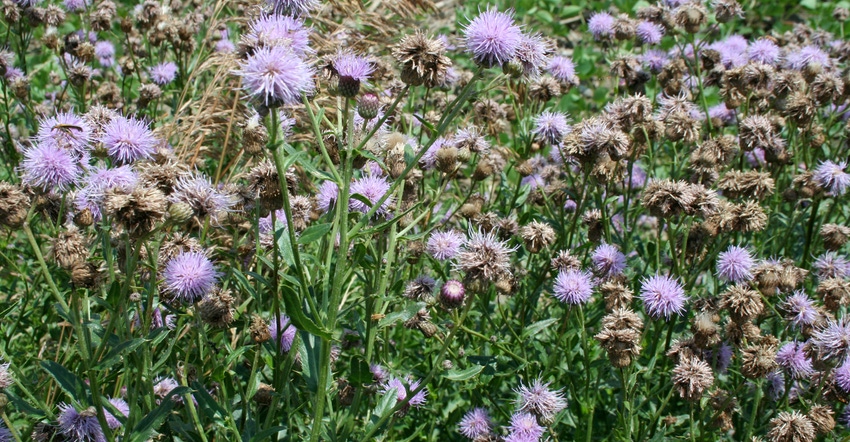
Many landowners expend great effort over many years to keep their land weed-free or nearly weed-free. There are few things that frustrate these landowners more than a neighbor who does not have the same dedication, allowing weeds to grow and ultimately go to seed. In this situation, does the diligent landowner have any recourse?
Weeds that are invasive, toxic and have other harmful characteristics are called noxious weeds. These are the type of weeds that pose the most concern to neighboring landowners. The Ohio Department of Agriculture has developed a list of noxious weeds in Ohio, and it occasionally updates the list. Currently there are around 30 weeds on the noxious weeds list, including johnsongrass, shattercane and Canada thistle. The entire list is published in the Ohio Administrative Code § 901:5-37-01.
Ohio noxious weed laws
Ohio has two specific laws related to noxious weeds. Ohio Revised Code § 971.33 addresses noxious weeds and brush in a boundary fence. This law requires a landowner to keep the 4 feet on his side of the fence free of noxious weeds and brush. If a landowner is not keeping the fencerow free of noxious weeds, the adjoining landowner must first notify the non-complying landowner of the noxious weed issue. If the noxious weeds still remain after 10 days, the complaining landowner can notify the township trustees of the issue. Once notified, the township trustees must view the property and determine if there is sufficient reason to remove the noxious weeds from the fencerow. If the trustees determine there is a need to remove the weeds, they can hire the work to be done, and the county auditor assess the neglectful landowner the costs of the removal.
A second law, Ohio Revised Code § 731.5, requires noxious weeds to be destroyed on private land beyond the fencerow. Anyone concerned about noxious weeds on private property may notify township trustees that noxious weeds are present on a particular property, and then identify that property. The township trustees must then notify the landowner of the complaint. The landowner must either destroy the weeds or show the township trustees why there is no need for doing so. If the landowner does not take action within five days, the township trustees may have the weeds removed and have the county auditor assess the costs to the landowner.
Law for public land
Noxious weeds are not just a problem on private land. Ohio law also requires noxious weeds to be controlled on public land. Ohio Revised Code § 5579.04 requires counties, townships and municipalities to mow or destroy all noxious weeds along roadways and streets. Any noxious weeds seen along roadways should be reported to the county, township or municipal authorities so that the weeds can be mowed or destroyed.
So, what if the neighbor’s weed problem is not on the noxious weed list? In this situation, there is no statute to address the situation. The affected neighbor could try to file a civil lawsuit based on trespassing or nuisance. The lawsuit is based on the theory that the weeds on the adjacent property reduce the use and enjoyment of the adjoining land. A legal remedy based on trespassing or nuisance will be much harder to prove. Consequently, it will be much harder to obtain a favorable result.
Ohio law takes noxious weeds seriously, as noted by the aforementioned three laws that provide landowners, and the public, remedies to have the weeds mowed or destroyed. If you have an issue with a neighbor with noxious weeds, it is always best to try to address the problem with the neighbor and work it out in a cooperative manner. Only after the neighbor refuses to take care of the problem should the township trustees become involved. Neighborly relations rarely improve after one neighbor reports the other to the township trustees for a violation of noxious weed laws.
Contact Moore, an attorney with Wright & Moore, at 740-990-0751, [email protected] or ohiofarmlaw.com.
About the Author(s)
You May Also Like




